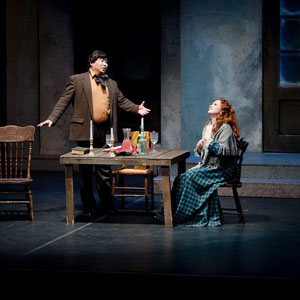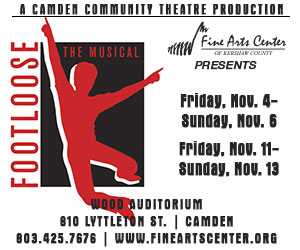Review – Palmetto Opera’s La Boheme

Photo Credit: David West
By Kyle Petersen
We tend to think of opera as high-brow entertainment, far removed from our modern culture by the passage of time as much as the language barriers which make the music sound alien and strange. But that really isn’t the right attitude. Yes, opera singers tend to be virtuosic, and the songs they sing richly composed and technically rigorous—but the music itself was originally designed to entertain the masses. While there are serious, dramatic operas rich in ponderous sorrow, the more popular ones tend to explore deep emotions of lust and romance, with a healthy dose of mischief and slapstick. Despite the uppity pretension that we associate with it, opera has the ability to communicate on the basest and most human of levels, simply through the power of voice.
And La Boheme is really exhibit A for this argument. One of the most popular operas of all-time, the 1898 Giovanni Puccini creation wins people over both with its subject matter as much as its musical acumen. It tells the tale of bohemian artists living in near-poverty in Paris, and—when they aren’t tricking their landlord into neglecting their rent or of sticking rich benefactors with the check—they are desperately engaged in matters of the heart. The two lead characters, Rodolfo and Mimi, are star-struck lovers not too far removed from the Romeo & Juliet mold in that they seem to capture the over-attenuated excess of falling in love. There’s a reason Jonathan Larson based his wildly successful Broadway rock musical Rent on La Boheme—these are the kind of fundamentals that pull at the heart strings.
Teatro Lirico D’Europa’s production of La Boheme—presented by Palmetto Opera—doesn’t do much to jolt the story from its 19th century moorings, but it doesn’t really have to. Utilizing a basic, well-conceived set design that allowed the act changes to shift easily from indoor to outdoor settings, the opera kept the focus cleanly on the four leads. Tenor Simon Kyung Lee as Rodolfo with Soprano Olga Orlovskaya, who stepped in for an absent Melliangee Perez, partnering with him as Mimi, and Baritone Dobromir Momekov playing Marcello to Soprano Stanislava Ivanova’s Musetta. Lee and Orlovskaya played up their early, tentative flirtations in Act I admirably, and both sang with verve and gusto throughout the night, an absolute must for the tortuousness love affair to resound deeply with their audience. While in lesser roles, Momekov and Ivanova were also quite good playing the more tempestuous and irascible foil to the opera’s leads. Momekov’s baritone was particularly splendid in the large hall, and Ivanova was the best actor in the bunch, capable of instilling Musetta with all of the hot-headed poise that her character requires.
Although you could quibble with a few things—the crowdedness of the café set in Act II, which called for lots of people and a far more tightly-confined stage than the other parts of the opera, was a rare moment where the production felt forced, and the costuming never established a clear sense of time period or class distinctions—the professionalism of the company and the rollercoaster drama of the story itself won the day. If there’s a comical element to these big, powerful voices sitting next to moments of great vulnerability or physical ailment, even that kind of works. Emotions are often outsized next to the often mundane realities of the world, which is why opera, over so many other musical forms, seems best at getting to the core of the basic emotions that seem to govern us all.
A fitting note, it seems, to cap off the fifth season of Palmetto Opera.
For more information about The Palmetto Opera and their upcoming events, visit palmettoopera.org






.jpg)
